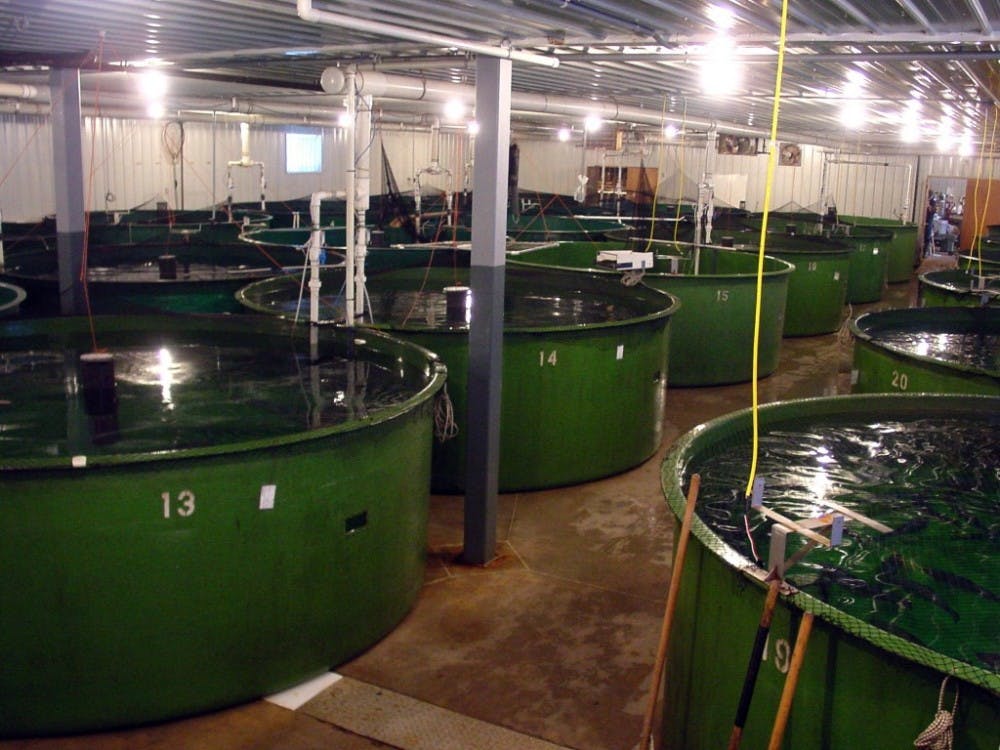Genetically engineered Atlantic salmon may soon become the first transgenic animal to be sold in grocery stores and supplied by food service vendors across the country, possibly including ARAMARK, Elon University’s food supplier.
The fish swam a bit closer to FDA approval when the administration released a draft of its environmental assessment affirming the modified salmon does not pose a considerable environmental threat last month.
In 2010, the FDA concluded the genetically altered AquaAdvantage salmon was safe for human consumption, generating controversy among proponents and opponents of biotechnology.
The modified salmon, engineered by AquaBounty Technologies at Prince Edward Island and grown in tanks in Panama, grow nearly twice the size of conventional Atlantic salmon at a faster growth rate. They contain two superfluous growth genes from other fish, including the Chinook salmon.
Proponents of the genetically engineered salmon see it as the future of the aquaculture industry, which includes the commercial farming and harvesting of fish, while opponents are concerned the hybrid salmon may escape its land-based confines and interbreed with wild Atlantic salmon.
If the FDA eventually allows the modified salmon to be purchased or sold for consumption, some stores will not supply it.
“We will not sell the genetically modified salmon,” said Whole Foods spokeswoman Beth Krauss. “Our farmed seafood standards require farm-to-fork traceability and require producers to provide detailed information on farming practices and pass independent third-party audits. These standards prohibit the sale of both genetically modified or cloned seafood and their progeny.”
ARAMARK may take a different stance.
“Professional experts are reasonably satisfied that the current regulatory guidelines in the United States and feel they reasonably address the safety of genetically engineered foods that are permitted by regulatory authorities to be brought to market,” said ARAMARK spokeswoman Karen Cutler.
Some members of the Elon community will support the sale of transgenic salmon.
"A lot of research is put into genetically modified foods,” said senior Marion Copeland. "I believe that if such a food product is to be put on the market, it is because it provides benefits to consumers."
But other members of the Elon community are concerned about the effects it may have on human health and the environment.
“When you take genes that were never intended to be in that animal, it’s opening up something that nature never intended,” said Stephen Moore, an environmental studies lecturer. “It’s irreversible.”
And if the FDA ultimately approves the modified salmon for market sale, it may not be explicitly labeled as a genetically altered product. According to federal health regulation, genetically modified food and their substantial equivalents do not differ on a material or nutritional level, and therefore do not require separate labeling.
“At this time, a decision is still pending on the AquAdvantage application,” said FDA spokeswoman Siobhan Delancey. “Therefore, no decision has been made on the labeling of food products from these salmon.”
Several countries around the world have implemented regulations monitoring the labeling of genetically modified food. Nearly all European countries require that the majority of modified food products be labeled.
Moore said he thinks the United States should consider similar regulations.
“People have the right to know and select genetically modified salmon or not”, he said. “As a community, we need to become more conscious of our food and work to be more environmentally and socially conscious of what we eat.”


